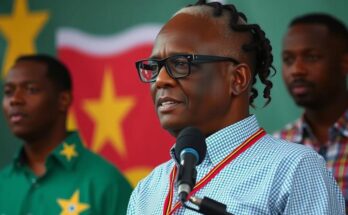At the IGF 2024, experts discussed the challenges of ensuring election integrity in an era dominated by misinformation and advanced technology, such as AI. They highlighted the need for collaborative solutions, particularly in light of the upcoming global elections, and emphasized the importance of tailored approaches to combat digital threats, especially in the Global South.
The discourse surrounding election integrity in the digital realm was brought to the forefront during the session titled ‘Internet governance and elections: maximizing the potential for trust and addressing risks’ at the 2024 Internet Governance Forum (IGF). Experts from various sectors engaged in a critical examination of how misinformation, disinformation, and advanced technologies like artificial intelligence (AI) and deepfakes pose significant threats to democratic processes. With over 65 elections occurring worldwide this year, the urgency to address these challenges could not be overstated.
Tawfik Jelassi of UNESCO articulated the alarming rise in disinformation, characterizing it as a principal global risk. He asserted, “Without facts, there is no trust, and without trust, democracy falters,” noting that misinformation disseminates at a rate tenfold that of verified information, thereby increasing public distrust in electoral processes. Panellists discussed the manipulative tactics employed by malicious actors who exploit digital platforms to skew voter perceptions, particularly through the use of deepfakes and coordinated deceptive behavior.
Elizabeth Orembo from ICT Africa highlighted the pressing challenges faced by countries in the Global South, where significant digital divides restrict media access and heighten vulnerability to misinformation. She emphasized that “we cannot apply blanket policies from tech companies without addressing regional contexts,” advocating for customized strategies that consider local infrastructural and cultural nuances, particularly in Africa where unregulated influencers can have outsized influence.
Sezen Yesil of Meta provided insights into her organization’s initiatives aimed at countering election-related disinformation, including enhancing measures to eliminate fake accounts and increasing transparency surrounding political advertisements. While she acknowledged the ongoing threats posed by AI-generated disinformation, she downplayed its immediate impact on the forthcoming elections. Nonetheless, a call for stricter accountability for tech corporations was echoed across discussions, with recommendations for robust legal frameworks like the EU’s Digital Services Act to mitigate potential digital harms.
The recurring theme of multistakeholder collaboration emerged as vital for safeguarding electoral integrity. Rosemary Sinclair from Australia’s AUDA remarked that protecting democracy is a “global team sport,” necessitating collective efforts from governments, civil society, academia, and the technical community. She underscored the IGF as an exceptional venue for fostering such collaboration and advanced the need for enhanced coordination with national and global IGF platforms.
Participants concurred that safeguarding election integrity requires ongoing commitment beyond election periods. It was clear that digital platforms, governmental bodies, and civil organizations must continuously strive to cultivate public trust, address digital inequalities, and establish frameworks geared toward protecting democracy amid evolving digital threats. The IGF’s crucial role in facilitating global dialogue and actionable strategies was reaffirmed, with heightened calls to amplify its influence in shaping future governance solutions.
The topic of election integrity in the digital age is critical given the increasing prevalence of misinformation and disinformation worldwide, particularly during election seasons. As technology continues to evolve, threats such as deepfakes and AI-driven content that can distort public perception have emerged, creating new challenges for democratic processes. Various sectors are now recognizing the necessity of collaborative efforts to safeguard electoral trust, particularly as numerous elections take place globally, necessitating a proactive response to these emerging threats.
In conclusion, the insights shared during the IGF 2024 emphasize the urgent need for comprehensive strategies to combat misinformation and protect election integrity in the digital landscape. The emphasis on multistakeholder collaboration and tailored regional approaches highlights that sustaining democratic processes requires an ongoing commitment from all sectors of society. The importance of robust legal frameworks and accountability for tech companies cannot be overstated as society navigates the complex interplay between technology and democracy.
Original Source: dig.watch



